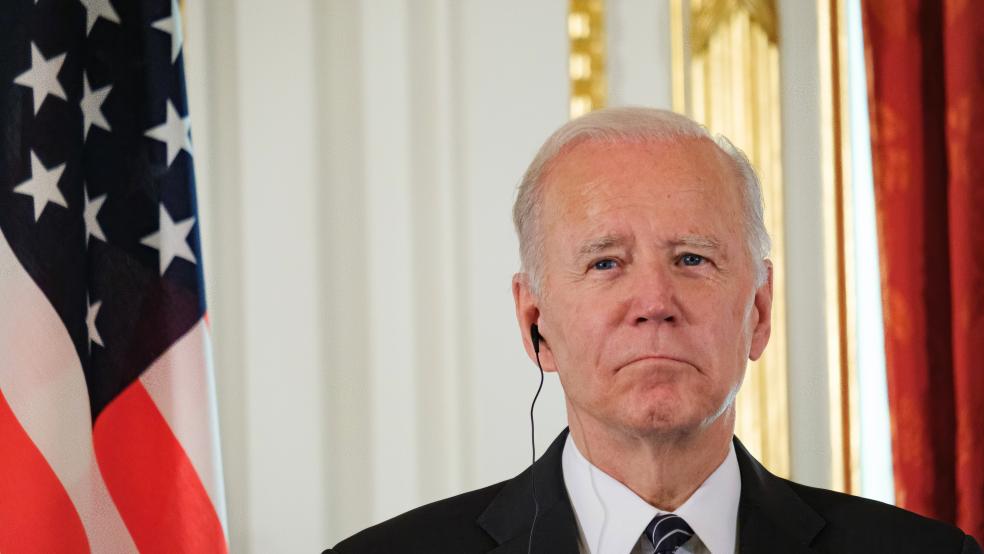President Joe Biden said Monday that he is considering cutting Trump-era tariffs on Chinese goods as a measure to combat inflation.
"I am considering it. We did not impose any of those tariffs. They were imposed by the last administration and they're under consideration," Biden said at a news conference in Tokyo with Japanese Prime Minister Fumio Kishida.
Biden’s comment comes as administration officials and White House advisers are reportedly engaged in heated debate over whether to cut the tariffs of up to 25% imposed by former President Donald Trump on hundreds of billions of dollars in goods imported from China annually.
Treasury Secretary Janet Yellen last week criticized the tariffs, saying that some of them “seem as though they impose more harm on consumers and businesses" and adding that they “aren't very strategic in the sense of addressing real issues we have with China — whether it concerns supply chain vulnerabilities, national security issues, or other unfair trade practices.” Biden said Monday he would discuss the issue with Yellen when he returns from Asia.
While Yellen, Commerce Secretary Gina Raimondo and others have pushed for tariff relief, other administration officials and Biden advisers have pushed back on the idea. U.S. Trade Representative Katherine Tai “wants to hold off for a broader China trade strategy that addresses protecting U.S. jobs and China's behavior in global markets,” Reuters reported last week.
“Like any negotiator, Tai does not want to surrender a bargaining chip without getting something in return,” The Washington Post’s David J. Lynch explained in an article Friday. “But she also doesn’t want to abandon tariffs to address an immediate inflation problem at the expense of the country’s long-run economic climate. Tai sees the tariffs as encouraging investment in U.S. industries that would be less attractive if they were unprotected against unfair Chinese competition.”
The politics: Other Biden advisers reportedly argue that the president risks looking weak on China and opening himself up to Republican attacks if he rolls back tariffs. And while business groups including the U.S. Chamber of Commerce favor reducing tariffs, progressives, some industry groups and unions — a key Democratic constituency ahead of November’s midterm elections — oppose the idea.
The economics: Economists and others point out that imports from China have not been the main drivers of inflation. “The cost of Chinese imports,” the Post’s Lynch writes, “has increased by 4.6 percent over the past 12 months, well below the overall jump in the cost of living.”
Analysts also say that the tariffs have failed to achieve their objectives — the trade deficit with China is on a record pace this year and complaints about China’s trade practices remain. But economists also suggest that cutting tariffs may have only a somewhat modest effect on inflation, especially with supply chain disruptions and Chinese factory shutdowns due to Covid-19 still factors. And any benefit would take time to be fully realized.
A March study by economists at the Peterson Institute for International Economics found that ending tariffs would reduce the consumer price index measure of inflation by 1.3 percentage points, or $797 per household. The index in April was 8.3% higher than a year earlier. “While a 1.3 percentage point haircut might seem small when inflation is raging at more than 7 percent, the relief is not trivial,” the authors wrote. An earlier study also from the Peterson Institute for International Economics found that removing tariffs on Chinese products could lower CPI inflation by about 0.3 percentage points and said that “this one-time drop in the price level would put only a small, short-lived dent in overall inflation.”
Economist Jason Furman, who led the Council of Economic Advisers under President Obama, told The New York Times that removing all Chinese tariffs would reduce the Consumer Price Index by about half a percentage point. But, he says, cutting tariffs is the biggest step Biden could take. “It’s larger than anything the White House or [Federal Reserve] could do within six months,” Furman told Politico. “It is the biggest tool they have, everything else is quite small compared to it.
Why it matters: Biden faces tremendous pressure to bring down inflation, which remains a top concern for voters, as fears of a recession also mount. A CBS News poll released Sunday found that 69% of Americans rate the economy as “very bad” or “fairly bad,” compared with 26% who call it “very good” or “fairly good.”
Biden on Monday said in response to a reporter’s question that a recession is not inevitable, but he again acknowledged Americans’ economic concerns. “Now, does that mean we don’t have problems?” Biden said. “We do. We have problems that the rest of the world has, but less consequential than the rest of the world has because of our internal growth and strength.”
But as Biden looks to address inflation, the administration debate over tariffs reflects a broader one among Democrats “over whether globalized trade has done more to help or harm Americans, and how the Democratic Party should approach trade,” The New York Times notes.
The bottom line: “[W]ith his advisers split, the potential economic gains limited and the danger of Republican attacks for being ‘soft on China’ looming, Biden is unconvinced,” The Post’s Lynch reported last week. And the Times adds: “Some Biden administration officials appear to favor an outcome that would lift certain tariffs while increasing other trade penalties on China, a process that would take at least several months.”





